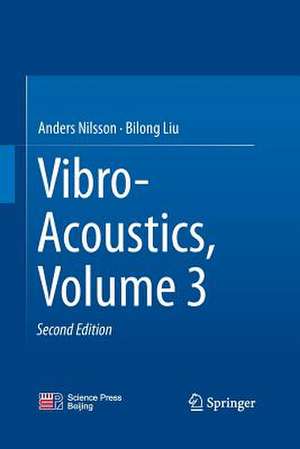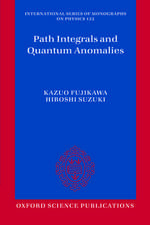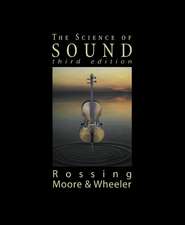Vibro-Acoustics, Volume 3
Autor Anders Nilsson, Bilong Liuen Limba Engleză Paperback – 23 aug 2016
| Toate formatele și edițiile | Preț | Express |
|---|---|---|
| Paperback (1) | 487.57 lei 43-57 zile | |
| Springer Berlin, Heidelberg – 23 aug 2016 | 487.57 lei 43-57 zile | |
| Hardback (1) | 481.20 lei 22-36 zile | |
| Springer Berlin, Heidelberg – 30 sep 2015 | 481.20 lei 22-36 zile |
Preț: 487.57 lei
Nou
Puncte Express: 731
Preț estimativ în valută:
93.33€ • 101.41$ • 78.44£
93.33€ • 101.41$ • 78.44£
Carte tipărită la comandă
Livrare economică 21 aprilie-05 mai
Preluare comenzi: 021 569.72.76
Specificații
ISBN-13: 9783662516591
ISBN-10: 3662516594
Pagini: 275
Ilustrații: XIII, 275 p.
Dimensiuni: 155 x 235 mm
Greutate: 0.41 kg
Ediția:Softcover reprint of the original 2nd ed. 2016
Editura: Springer Berlin, Heidelberg
Colecția Springer
Locul publicării:Berlin, Heidelberg, Germany
ISBN-10: 3662516594
Pagini: 275
Ilustrații: XIII, 275 p.
Dimensiuni: 155 x 235 mm
Greutate: 0.41 kg
Ediția:Softcover reprint of the original 2nd ed. 2016
Editura: Springer Berlin, Heidelberg
Colecția Springer
Locul publicării:Berlin, Heidelberg, Germany
Cuprins
Problems.- Solutions.- Summary of Result.
Notă biografică
Anders Nilsson holds MSc in Engineering Physics from University of Lund, Sweden and Dr.Tech. in Sound and Vibration from Chalmers University. Anders Nilsson has worked on problems relating to the propagation of sonic booms at Boeing Co., Seattle, USA. At Det Norske Veritas he became head of the Acoustics Department at the Research Division. At Veritas Anders Nilsson worked on the propagation of structure borne sound in large built up structures and on the excitation of plates from flow and cavitation. Anders Nilsson was head of the Danish Acoustical Institute for four years. His main activities in Denmark were building acoustics. In 1987 Anders Nilsson was appointed professor of Applied Acoustics at KTH in Stockholm, Sweden. He was also the head of the Department of Vehicle Engineering and the founder and head, until 2002, of the Marcus Wallenberg Laboratory of Sound and Vibration Research (MWL). Anders Nilsson is since 2008 professor emeritus at MWL, KTH. His main interests are problems relating to composite structures as well as vehicle acoustics.
Bilong Liu received his PhD in acoustics at the Institute of Acoustics, Chinese Academy of Sciences in 2002. He was thereafter supported financially by an EU-project- Friendly Aircraft Cabin Environment- and worked on noise transmission through aircraft structures at MWL, KTH till 2006. Bilong Liu also holds a PhD in applied acoustics from MWL. During the period Aug. 2004 to Jan. 2005 he also worked on pipe/pumpnoise at t
he University of western Australia in Perth. From 2007 he is working as a research professor at the Institute of Acoustics, Chinese Academy of Sciences. His main interests include vibro-acoustics, fluid induced noise, duct acoustics, active noise control, smart acoustic materials and structures.
Bilong Liu received his PhD in acoustics at the Institute of Acoustics, Chinese Academy of Sciences in 2002. He was thereafter supported financially by an EU-project- Friendly Aircraft Cabin Environment- and worked on noise transmission through aircraft structures at MWL, KTH till 2006. Bilong Liu also holds a PhD in applied acoustics from MWL. During the period Aug. 2004 to Jan. 2005 he also worked on pipe/pumpnoise at t
he University of western Australia in Perth. From 2007 he is working as a research professor at the Institute of Acoustics, Chinese Academy of Sciences. His main interests include vibro-acoustics, fluid induced noise, duct acoustics, active noise control, smart acoustic materials and structures.
Textul de pe ultima copertă
This three-volume book gives a thorough and comprehensive presentation of vibration and acoustic theories. Different from traditional textbooks which typically deal with some aspects of either acoustic or vibration problems, it is unique of this book to combine those two correlated subjects together. Moreover, it provides fundamental analysis and mathematical descriptions for several crucial phenomena of Vibro-Acoustics which are quite useful in noise reduction, including how structures are excited, energy flows from an excitation point to a sound radiating surface, and finally how a structure radiates noise to a surrounding fluid. Many measurement results included in the text make the reading interesting and informative. Problems/questions are listed at the end of each chapter and the solutions are provided. This will help the readers to understand the topics of Vibro-Acoustics more deeply. The book should be of interest to anyone interested in sound and vibration, vehicle acoustics, ship acoustics and interior aircraft noise.
This is the third volume, and presents 201 problems and their solutions plus a summary of the main results from volumes 1 and 2.
This is the third volume, and presents 201 problems and their solutions plus a summary of the main results from volumes 1 and 2.
Caracteristici
Introduces basic concepts and mathematical methods of Vibro-Acoustics Covers the basis of vibration, structure-borne sound and acoustics Guides the students to the subjects of Vibro-Acoustics step by step, from simple one-degree-of-freedom systems to more complex ones Illustrates the fundamental theories with verifications by laboratory and field measurements Provides problems for each chapter with solutions Serves as both a reference work for researchers and a study text for graduate students Includes supplementary material: sn.pub/extras














